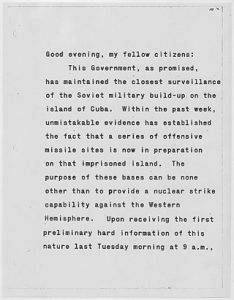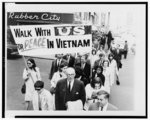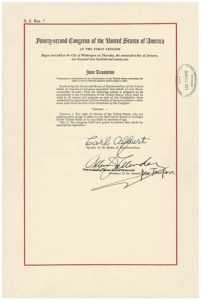President John F. Kennedy Radio and Television Report to the American People on the Soviet Arms Buildup in Cuba (1962)

This is an excerpt of a radio and television report of President John F. Kennedy’s speech that took place on October 22nd, 1962. In his speech, President Kennedy informed the American people of the presence of missile sites in Cuba. When the United States put a naval blockade around Cuba, tensions began to increase, and the world watched in agony to see if there could be a peaceful resolution to the crisis. During this time the American people started to worry because as the Soviet Union placed nuclear missiles in Cuba, it gave them the power to launch a nuclear attack on the Western Hemisphere.
Dr. Benjamin Spock leading march to the United Nations to demand a cease-fire in Vietnam (1965)

In this photo is Dr. Benjamin Spock walking with other protesters demanding for the United States to a cease-fire in Vietnam. The photo was taken in 1965. This photo was all over the news, and showcased the protest, causing people to start supporting the movement. The key figure in the photo Dr. Benjamin Spock who was an American pediatrician was famous for his parenting advice book. It wasn’t uncommon to find US citizens joining the protest against the Vietnam War, as many American citizens found the war unnecessary and unfair. This photo demonstrates the multitude of the anti-war movement during the Vietnam War.
The Ballad of the Green Berets – Staff Sergent Barry Sadler (1966)
The Ballad of the Green Berets is a pro-Vietnam War song from 1966 sung by Staff Sergent Barry Sadler. Sadler was a member of the Green Berets, a US Army elite Special Forces unit. Sadler served as a medic and nearly had his leg amputated after he was injured. Sadler wrote songs for other wounded soldiers as he was healing from his own injuries. Sadler wrote this song to boost morale among the American troops fighting in Vietnam when public opinion was low. This song demonstrates that even though the Vietnam War was seen as an unnecessary war by the majority of the public eye, Some veterans still believed in what the United States was fighting for.
Creedence Clearwater Revival – Fortunate Son (1969)
Fortunate Son was recorded during the Vietnam War in 1969 by Creedence Clearwater Revival. This song is regarded as one of the most influential anti-war songs of the Vietnam War era. Creedence Clearwater Revival produced many songs with unknown meanings, but Fortunate Son isn’t one of those. The song’s lyrics speak out against time before the volunteer army. During the Vietnam War young men of ages 18 years old were drafted in the army to be used to fight overseas in the Vietnam War. Young men who were the children of famous politicians and families of money were safe from the draft due to their status in society. They were often called ‘The fortunate ones”. The song Fortunate Son argues against this saying, “I’m no fortunate one.” This song demonstrates how the status of an American citizen can influence their role in Wars.
26th Amendment to the U.S. Constitution (1971)

Passed by Congress March 23, 1971, and ratified July 1, 1971, the 26th amendment granted the right to vote to American citizens aged eighteen or older. Before this Amendment was passed and ratified, the legal voting age for men American citizens was 21 years or older. The movement to change the legal voting age was due to the idea that men could be drafted into the Army at the age of 18 and fight for their country. But these men could not legally vote for their country. This document demonstrates how the Vietnam War influenced American citizens to fight for the changing of United States domestic laws.
